Start - Aktualności - The Eko Week with the Silesian University of Technology is already behind us
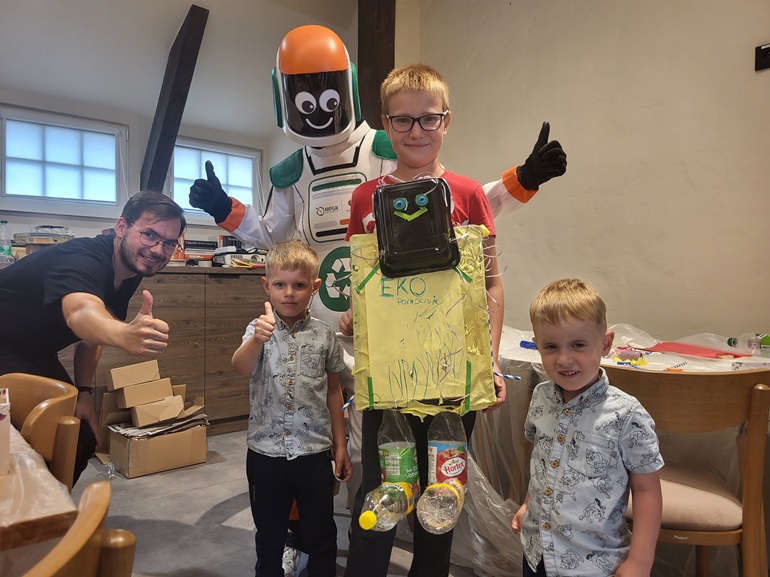
The Eko Week with the Silesian University of Technology is already behind us
The world of ecology and sustainable development – this was the main slogan of the Eco Week at the Silesian University of Technology. The event took place as part of the European City of Science Katowice 2024 celebrations.
The program of the Eko Week included unusual workshops, meetings, and popular science lectures, which showed the diversity and multi-faceted nature of ecological issues in almost every discipline of life.
The Eko Week within the European City of Science Katowice 2024 is a unique time in which we want to not only promote ecological attitudes, but also realize how important it is to take care of our planet. This is a great opportunity to learn more about ecology and understand that caring for nature is not only a duty, but also an inspiring journey full of innovation and interesting solutions. Eko Week aims to encourage all of us to work for our planet and show that ecology can be a passion, not just a necessity – said the curator of the event, Dr Hab. Eng. Ewa Brągoszewska, prof. of Silesian University of Technology
The event was addressed to everyone who wanted to learn more about ecology – from families with children, through youth, to adults and seniors. Everyone who wants to understand the importance of ecological attitudes and what can be done to live in harmony with nature has found something for themselves.

On the first day there were workshops and meetings. At the Katowice Creativity Centre SPINplace, workshops for the youngest were organized under the slogan - “Be Eco with EcoBot!”
During the workshops, the kids learned how to properly segregate garbage, what to do with electrical waste, where to return it and how to call an electro-garbage truck, which will take, for example, an old refrigerator. After a short lecture there were art workshops, where preschoolers made eco-robots from plastic bottles and pieces of paper. In this way, we wanted to show them that not all waste has to be thrown away, because some of it can be used, for example, during play – said Aneta Dereszewska, the workshop leader.
The co-organizer of the workshop was the Municipal Services Authority in Katowice.
“It is important to teach children the basics of ecology from an early age. The kids had a great time and learned a lot. It is worth participating in such workshops and we thank the Silesian University of Technology that we could take part in them – added Małgorzata Idasiak, the mother of Marek and Cezary preschoolers.
During Monday's workshop, the children built a robot from waste, they met EkoBot, who told them what to do with electrical waste. At the end of the meeting there was a short trip to the Municipal Services Authority in Katowice, where the kids could see how the garbage truck collects waste in the city works.
On the first day of the Eko Week, there were also events addressed to a slightly older audience. With the participation of representatives of the Club of Environmental Thought, an online discussion entitled “Ecology in education – ecological awareness of Poles” was prepared.
The participants presented pessimistic forecasts related to educating the public about climate and environmental change.
The problem is that the school does not teach that the situation of the planet is critical, that we have the so-called red alert on Earth and what is the cause of it. This is done by a group of several teachers-enthusiasts, but the education system does not transmit such knowledge – said Professor Piotr Skubała I stressed that the solution is not to introduce one subject called ecological education.
Among the solutions proposed during the discussion, which would contribute to raising environmental awareness not only in schools but also among adults, there is an incentive to use ecological footprint calculators or to directly experience the effects of climate change through contact with nature.
“What may be surprising is that research shows that the environmental awareness of young people is lower than that of older people. We also see this in the Youth Climate Strike, where few people want to engage in pro-ecological activities – added Dr Ryszard Kulik.
The conversation with environmentalists is available on the YT channel of the European City of Science Katowice 2024.
Unusual Hasiomaszketnik Workshops were held in the Centre for New Technologies of the Silesian University of Technology. “Hasiomaszketnik means that in a pile of waste we are looking for treats, something that has value, that we can transform and give such a thing a new life. This is a new trend. Each of us produces a lot of waste and in order not to landfill or waste it, we can restore it for reuse – for example, making art from it – said Dr Eng. Monika Czop, who conducted classes.
The first day of the Eko Week ended with two events that took place in Katowice. First, at Kato Science Corner, a dozen or so participants took part in the Zero Waste Plant Kitchen workshop, which was led by Olaf Józefoski from the Free Tea Association.
We talked about zero waste, which means reducing waste. I talked about how to store food so that it does not waste, and I also wanted to inspire listeners with freeganism, that is, the search for food suitable for consumption in garbage cans, usually in containers at grocery stores – explains Olaf Józefoski.
The day ended with a meeting “Among Weeds” with Jacek Hugo-Bader, a journalist and reporter, who refers in his work to ecological themes and fascinating culture of the countries of the former Soviet Union. The meeting took place at the Council of Europe Square in front of the Silesian Library.
In an interview with Bartłomiej Majzel, a poet and radio journalist, Jacek Hugo-Bader talked about eco-sensitivity, disappearing nature and nomadic peoples. At the end, dozens of participants could also ask journalist questions.
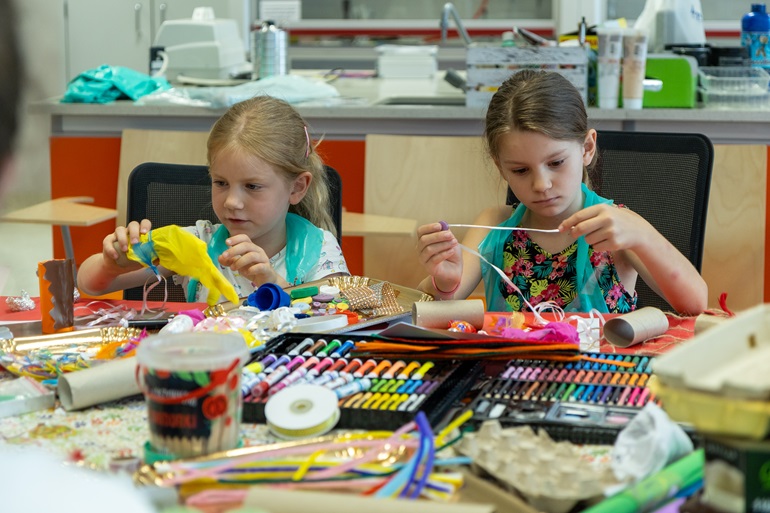
On the second day of the Eko Week, a workshop “We create Eco-toys” was held, which was conducted by students of the Silesian University of Technology operating in the Scientific Club “The Air Quality Team.” During the workshops, children made toys from waste such as egg packaging, shoes, caps, or plastic bottles.
– We want to teach children what ecology is, how to segregate garbage, what we can do to help the environment, because we are the ones who harm it the most – explains Nikola Dąbek, a student of the Faculty of Energy and Environmental Engineering.
Also, on Tuesday in Kościuszko Park in Katowice there was a mindful EkoWALK, led by Patrycja Stukator from “I Feel the Forest” - a website dedicated to health and well-being. The walk was taken by intergenerational group– mothers with children, people with disabilities and seniors.
“During the walk, we sharpened our senses, the participants listened to ECO-poems, used magnifiers to observe nature,” said Patrycja Stukator. – It was supposed to deepen the connection of the participants with nature. Mindfulness of nature, combined with the movement of the body, will allow us to feel that we are in a strong relationship with every living entity on this planet.
The second day of the Eko Week ended at Kato Science Corner, where Joanna Bronisławska, acting under the artistic pseudonym of Asia Mina, conducted the Ekoband – Recovery Music workshop.
– I prepared workshops for children, during which we wondered what ecology in music is. We talked about whether we need to create instruments or just listen to the sounds around us. However, we also tried to create instruments from seemingly unnecessary objects, giving objects a second life, which in a moment would end up in the garbage – explained Joanna Bronisławska.
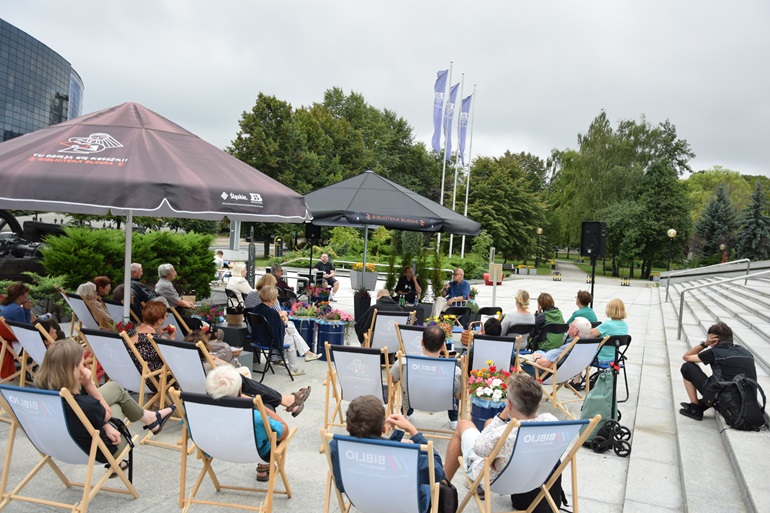
On the third day of the Eko Week, workshops on making natural cosmetics and an author’s meeting with a reporter Wojciech Jagielski took place. In addition, workshops on clean air, different forms of wood and activities of the State Forests were held.
There were more people interested in the cosmetics workshops than there were places. The classes, which took place at Kato Science Corner, were prepared by the Free Tea Association.
“We have prepared bathing balls, a home deodorant, a fluoride-free toothpaste based on baking soda, as well as magnesium olive and a home-made cleaner,” said Olaf Józefoski, who admits that interest in an environmentally friendly lifestyle is becoming more and more popular. “We are becoming more aware; we want to use products that are safe for our health and the environment at the same time. During the presentation, I told the participants what substances should be avoided in cosmetics and how to replace them with what we have at home.
The participants listened with great interest to the tips on how to prepare products.
- I was informed that there were no available places for participants, but I came anyway, because I wanted to learn more about this - said Aleksandra Pawlak, one of the participants of the workshop.
The topic of how the environment can affect our health was discussed during the lecture “Clean air – a healthy future” in the laboratory of the Department of Air Protection at the Silesian University of Technology. In this way, the devices used to collect air pollutants and how they are tested were presented. The event was led by Dr Hab. Eng. Anna Mainka, prof. of Silesian University of Technology
During another presentation in Kato Science Corner, the projects implemented for over a decade by the State Forests were discussed, whose main goal is the protection and development of forest ecosystems, the growth of natural diversity and broadly understood protection of the surrounding nature.
In a broad sense, ecology and the climate crisis were also discussed in the Eco-Reading Room of the Silesian Library during the author’s meeting with Wojciech Jagielski.
The reporter was a correspondent during the war. He reported on the situation in the Middle East and Africa. He witnessed the degradation of the natural environment. He knows from his experience that the climate crisis and environmental destruction lead to the need for migration and migration.
“As a journalist, I’m beating my chest that I didn’t see in time that many wars were not caused by disagreements between parties or bad decisions by the government, but also by climate change,” he said. “People who have come to power know how to stage an ambush or plant a bomb, but not how water supply system works and how to design a sewage treatment plant.”
The meeting in the Silesian Library attracted a large group of listeners, including local government officials.

On the fourth day of the EKO Week, participants were able to face the Canmagedon obstacle course and plant flowers. There was also a discussion panel with the inhabitants of the region and representatives of local governments.
The day began with the workshop “Clean air – Eco-ways to fight micropollutants,” which took place at the Centre for New Technologies of the Silesian University of Technology.
“We wanted to show children how to fight micropollutants in an ecological way, including bacteria or fungi. We also told them about innovative air purifiers into which plants are inserted and thanks to this we have better air at home – explains Natalia Patoń from SKN - The Air Quality Team, which operates at the Faculty of Energy and Environmental Engineering. “With the help of various devices, we take air and analyse it for microorganisms and how they affect our health,” the student added.
At the SPINplace Creativity Centre in Katowice, there was a panel discussion "10 things you can do for clean air. The sum of small actions successful in the fight against smog.", implemented as part of the integrated project LIFE: "Silesia. We are bringing back the blue.” It was attended by the inhabitants of the region and representatives of local governments.
Kato Science Corner hosted the participants of the “Music everywhere!” workshop, during which children learned what recycling, instruments, surroundings, and music have in common, while in the Silesian Park daredevils could face the eco-track of obstacles – Canmagedon, prepared by the RECAL Foundation for the Recovery of Aluminium Packaging.
- We have built a track within the framework of the project "Every Can Is Valuable" - says Artur Lobocki from the Foundation for the Recovery of Aluminium Packaging RECAL. We wanted to show that recycling is not difficult. Although this track seems heavy at first glance, after taking it, it turns out that it was not so difficult. The same goes for recycling. Canmagedon refers to the different stages of recycling aluminium cans. The first station is collection, then sorting, until it leads us to produce new cans, fill them and put them in the store.
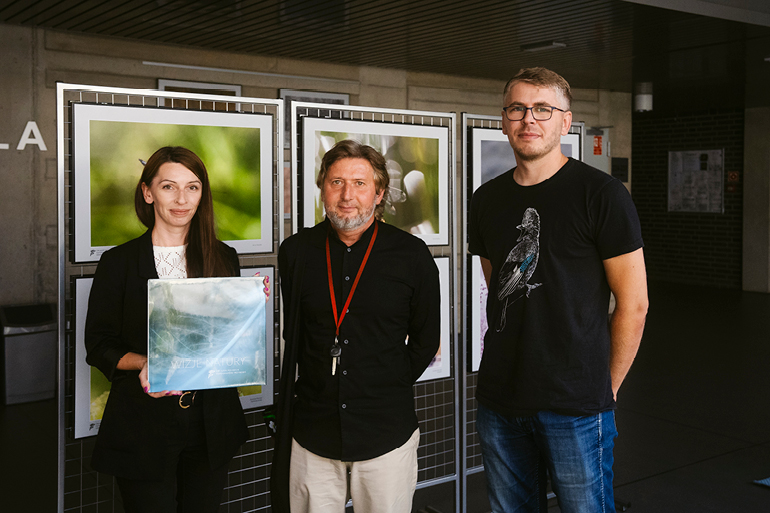
On the fifth day of the Eko Week, an extraordinary meeting took place, during which scientists and residents of the region could see photographs of Silesian nature.
“Silesian nature – more exotic than you think” – under this slogan an author’s meeting with Tomasz Sczansny, a nature photographer and ornithologist took place. At the headquarters of the Centre for New Technologies of the Silesian University of Technology, photography enthusiasts and the inhabitants of the region, thirsty for knowledge about the secrets of Silesian nature, met.
Nature photography can bring a lot to the world of science. We are able to capture some unique habits of animals in the pictures - explained Tomasz Sczansny, who has been taking nature photography of the Silesian Voivodeship for years It convinces us that it is easy to find here birds of paradise, whose colours delight with a variety of colours.
Very few photos are taken by chance. I have been preparing for some shots for years. I waited two years for the opportunity to take a picture of flying squirrels. It involved gaining knowledge. I read about the habits of this animal, I looked for the areas where it occurs, and then there were hours of waiting until I finally succeeded.
On the same day, a large dose of knowledge about ecology was also waiting for visitors to Kato Science Corner and SpinPlane and the CINiBA library in Katowice, where lectures and ecological workshops were held. During the workshops, participants had the opportunity to get to know different species of bees, learn about their role in the environment, and also make candles themselves.
Friday also saw the debate "The Future of the Circular Economy: Challenges and Opportunities" hosted and moderated by a leading expert in bioenergy innovation Prof. Balal Yousaf from the Silesian University of Technology.
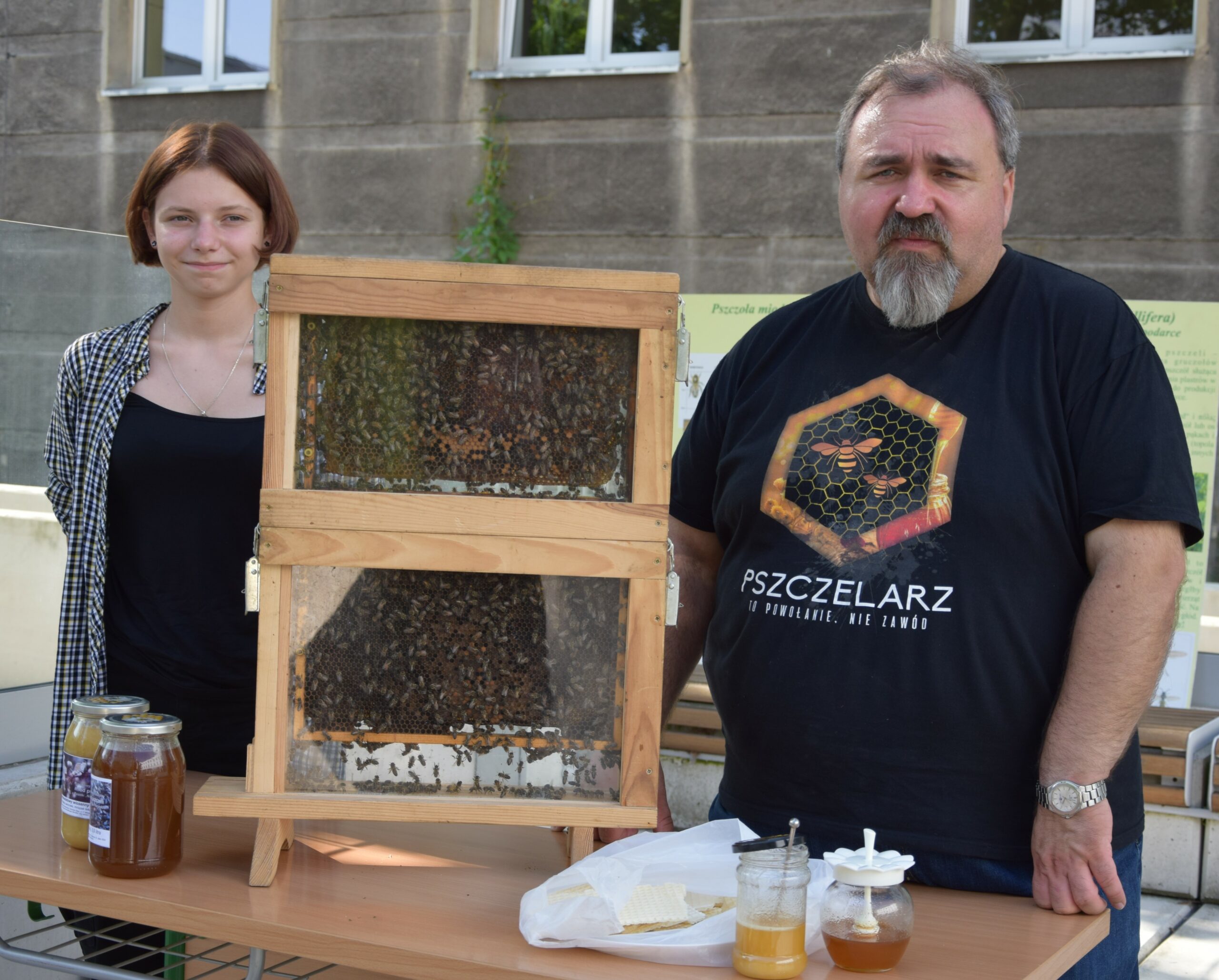
On Saturday, as part of the EKO Week, we could learn more about honey and bees and also take part in recycling workshops. The day started with EkoWALK: “Meetings with nature – Wyrchczadeczka” organized by the Vistula Forest District. A dozen or so participants had the opportunity to visit, among others, Wood Grouse Wolier Kennel or the highest located apiary in the Beskidy Mountains.
Traditionally, interesting workshops were taking place at Kato Science Corner in Katowice. This time they were led by students from the Academy of Fine Arts in Katowice.
- We came up with the idea of organizing workshops for two age groups – explains Marta Tokarz. “We used things that might seem unnecessary, and here they got a second life. These include newspapers, notebooks, or leaflets. First, the younger group made collages. Older participants had the opportunity to make eco-notebooks. This is something that will be useful to them, and they did it with items that we often find in our homes.
At the same time, in Kato.werk – Silesian social workshop in Katowice, the Water Duck Association held a workshop called “Valuable plastic.”
- We specialize in upcycling and recycling of plastics, education on this subject and the harmful effects of plastic - says Magdalena Janosz, who led the meeting together with her husband Wojciech. - Not only during these workshops, but also every day, you can see in our studio what recycling plastic literally is. We rely on smaller versions of recycling devices in the educational version, instead of the industrial version.
The participants could learn what plastic is, what its types and properties are and how the recycling process takes place step by step.
The day ended in Gliwice in the inner courtyard of the Faculty of Mining, Safety Engineering, and Industrial Automation of the Silesian University of Technology, where Dr Eng. Jacek Nowak, a scientist at this faculty, prepared the stand and gave lectures “Ecomission – between blocks of flats and flowers. Learn the secrets of bees in the big city.”
This event attracted both children and adults, who could see the beehive up close, and look for the queen bee in it. They also took part in the honey tasting and, above all, got a lot of information about bees and their work.
"This is a miniature of a real hive, in which we can observe the developmental cycle of these interesting insects, both in terms of biology and their behaviour" - explains Dr Eng. Jacek Nowak, who is passionate about beekeeping. - In addition to tasting, I also talked about other bee products. Without their hard work and pollination, food production would be much more difficult. That is why we have to take care of them.
The Eko Week ended with an exhibition of eco-toys and an eco-screening film.
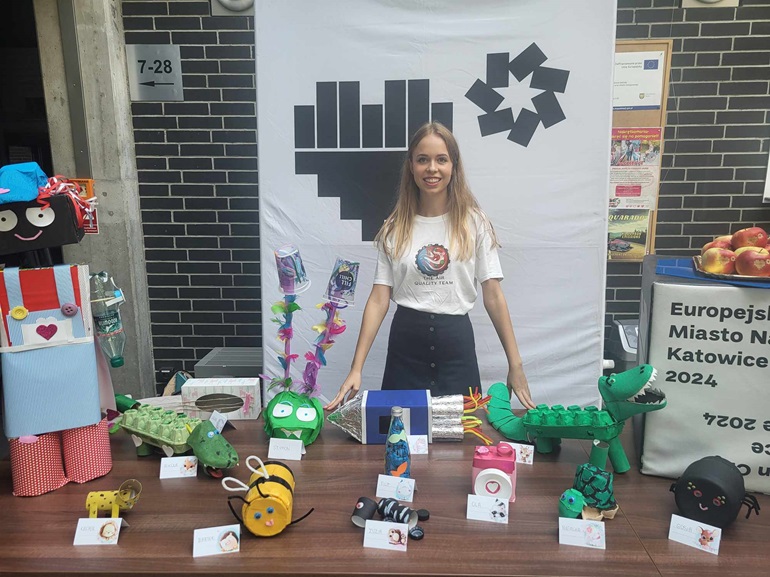
On Sunday morning in the Centre for New Technologies of the Silesian University of Technology you could see eco-toys that were created during Tuesday's workshops. – They allowed children to develop creativity, increase awareness in the field of ecology, environmental protection, or knowledge on how we should segregate garbage – said Natalia Patoń, the lecturer of the Student Scientific Club- the Air Quality Team, operating at the Faculty of Energy and Environmental Engineering.
The little creators built a robot, a rocket, a dinosaur and even a cardboard guitar. Eko Week ended with EkoSEANS at the KOSMOS cinema in Katowice. The participants saw a film about Simon Kossak – a legendary researcher who lived surrounded by animals in the Białowieża Forest.
The curator of the Eko Week was Dr Hab. Eng. Ewa Brągoszewska, prof. SUT, the producer was MSc. Eng. Ewa Głuszek.
The text was prepared by Jolanta Skwaradowska. The events were reported by Anna Świderska, Katarzyna Siwczyk, Martin Huć and Jolanta Skwaradowska.









